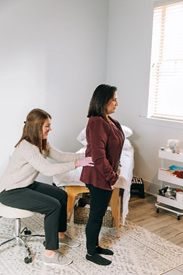- Benefits of Pelvic Floor Physical Therapy
- Men's Health: Treating Erectile Dysfunction with Pelvic Floor Physical Therapy
- Women's Health: Treating Painful Sex through Pelvic Floor Physical Therapy
- Treating Incontinence and Painful Urination With Pelvic Floor Physical Therapy
- Treating Constipation and Fecal Leakage with Pelvic Floor Physical Therapy
Pelvic Health Physical Therapy

Did you know the pelvic floor muscles span the bottom of the pelvis and support the pelvic organs (bladder and bowel, and uterus (womb) in women)?
Pelvic Floor Dysfunction (PFD) contributes to various symptoms in both men and women as a result of the dysfunction of muscles that make up the floor of your body. ACE Rehab specializes in the treatment of PFD and can provide discreet and comfortable examinations, as well as utilize techniques and training that can provide patients with relief from their symptoms.
When pelvic floor muscles are weakened and pelvic floor dysfunction (PDS) occurs you can develop problems with your bladder and bowel control. Your sex life might be altered drastically and some of the organs might not get the support that is needed to keep them where they belong. Overall, it’s a pretty important part of your body, but oftentimes gets overlooked and untreated because you might be embarrassed or scared to tell your doctor about your symptoms.
If you are seeking help with urinary, bowel, sexual symptoms like pain, incontinence or prolapse (from bulging organs), ask your doctor to refer you to a pelvic floor specialist. Most conditions can be treated successfully and in a relatively short period of time.
Our pelvic floor therapists will help educate you about your pelvic floor- what it is, where it is and how it functions.
ACE Physical Therapists are trained to treat the following Pelvic Floor Dysfunction conditions:
- Pelvic pain
- Constant or chronic constipation
- Painful intercourse
- Incontinence
- Urinary urge or painful urination
- Feeling of incomplete bowel movement or the need for several bowel movements
- Low back pain of unknown origin
- Erectile Dysfunction
- Urine or fecal leakage
- Abdominal pain
- Pregnancy and postpartum conditions
- Coccydynia (Tailbone pain)
- Gynecological cancer (Pre and post chemo therapy)
- Pudendal Neuralgia
- Athletic injuries
- Menopausal symptoms
- Endometriosis
- Vulvodynia
- Interstitial Cystitis (painful Bladder syndrome)
- Irritable Bowel Syndrome
What to Expect at your First Appointment
Once you schedule your appointment with us, you will receive registration packet. Please review these papers and fill them out to your best knowledge prior to your scheduled appointment. The packet is extensive, but you will only have to fill it out one time. This gives our therapists a better understanding of your specific reason for coming to see us.
We get to know each other first!
Our pelvic floor therapists will spend the vast majority of the first visit getting to know you. A good therapist/patient relationship can helps us communicate better and gain an in depth understanding of your condition. The more we know, the easier it is to treat your specific condition. This visit will be in a private room and you should feel comfortable discussing why you came to see the specialist and what you can expect to get from the specialized treatment protocol.
Some of the questions your PT specialist might ask you can include:
- How often do you pee?
- How often do you poop?
- Do you have any straining when you pee or poop?
- Are you noticing any leakage of urine- with activity (laughing, coughing, sneezing) or when you walk to the bathroom, or really any other time of day
- Are you sexually active? Do you have pain?
- Any other medical conditions or issues that we need to be aware of?
- About your diet and eating habits

Physical Examination
After the therapist has gotten an extensive history of your symptoms, concerns and goals, they will begin the physical part of the examination. The therapist needs to assess how your body moves as a whole because everything is connected. The therapist will assess the strength and function of your pelvic floor muscles. The therapist needs to assess how your pelvic floor muscles are functioning with the rest of your body movements.
Here are a few things our therapists will examine:
- Looking at how you breathe
- Checking your pelvic alignment
- If you are postpartum, checking for diastasis recti (DRA) or separation of abdominal wall
- Assessing for tender spots in your abdominal wall
- Checking for tender spots in your hip muscles
- Watching you walk
- Observing your standing posture
- Looking at hip mobility and strength
- Performing external and/or internal assessment of pelvic floor muscles for tenderness, strength and endurance if indicated

Many people come into our office dreading an internal assessment because of something they have read or they assume it will be just like going to their doctor. Your therapist specialist will explain everything to you, and you will be asked to give your consent to the internal exam. It can reveal a vast amount of information that the specialist can use to create your specific treatment plan.
